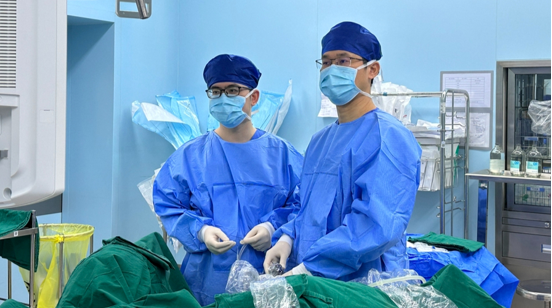- News
A Kidney Stone Led to Septic Shock in a Nonagenarian: Shanghai General Hospital Team Performs Emergency Surgery to Avert Crisis
https://www.shobserver.com/staticsg/res/html/web/newsDetail.html?id=844235

"Who would have thought a single stone could be so dangerous?" sighed 95-year-old Grandma Yin from her bed in the Urology Department at Shanghai General Hospital. Just days ago, she underwent ureteroscopic laser lithotripsy to remove a large ureteral stone and multiple kidney stones. Reflecting on the life-threatening experience of septic shock caused by the obstructing stone, she still feels a lingering fear.
At the end of 2024, Grandma Yin suddenly experienced severe pain in her right lower back, quickly followed by fever and vomiting. Her family rushed her to the emergency department at Shanghai General Hospital. By the time she arrived, she was lethargic, breathing rapidly, and gasping for air. Her heart rate had reached 112 beats per minute, and her blood pressure had plummeted to 80/55 mmHg. The emergency team immediately established intravenous access and administered fluids, vasopressors, oxygen therapy, and antibiotics. A CT scan revealed a large stone in the right ureter causing obstruction and hydronephrosis, leading to infection, along with multiple stones in her right kidney. Blood tests showed significant abnormalities, confirming the severity of her condition.
Dr. Shao Yi, Director of the Department of Urinary Stones and Upper Urinary Tract Reconstruction (North) at Shanghai General Hospital, quickly diagnosed the case as severe septic shock caused by stone obstruction. Given Grandma Yin’s advanced age, poor baseline cardiopulmonary function, and symptoms such as renal insufficiency, altered consciousness, and severe thrombocytopenia, the situation was highly critical, placing her major organs on the brink of failure.
With the full understanding and trust of Grandma Yin and her family, Dr. Shao’s team, in collaboration with the Anesthesiology Department and the Emergency Critical Care Unit, performed an emergency ureteral stent placement. Under anesthesia, the team accessed the urethra to insert a ureteroscope into the bladder. They then identified the opening of the right ureter and navigated a guidewire past the obstructing stone, placing a ureteral stent to drain the infected pus from the kidney.
Following the procedure, Grandma Yin was cared for in the ICU by a dedicated team who administered antibiotics to control the infection, improved her cardiopulmonary function, raised her platelet count, and provided enhanced nutritional support. She overcame multiple critical hurdles and ultimately stabilized. Considering her advanced age, the medical team advised a period of rest and recovery at home before returning for definitive stone removal surgery.
Recently, Grandma Yin returned to Shanghai General Hospital to address the root cause of her septic shock. Dr. Shao’s team successfully performed ureteroscopic laser lithotripsy, clearing the ureteral stone and multiple kidney stones.
Doctors remind the public that urosepsis caused by obstructions such as ureteral or kidney stones is a common cause of sepsis. Patients often experience unilateral lower back pain, fever, headache, nausea, and vomiting. If symptoms such as back pain and fever occur, prompt medical attention is essential.
Source: Shanghai Observer
Author: Li Chenyan, Wenhui Daily
